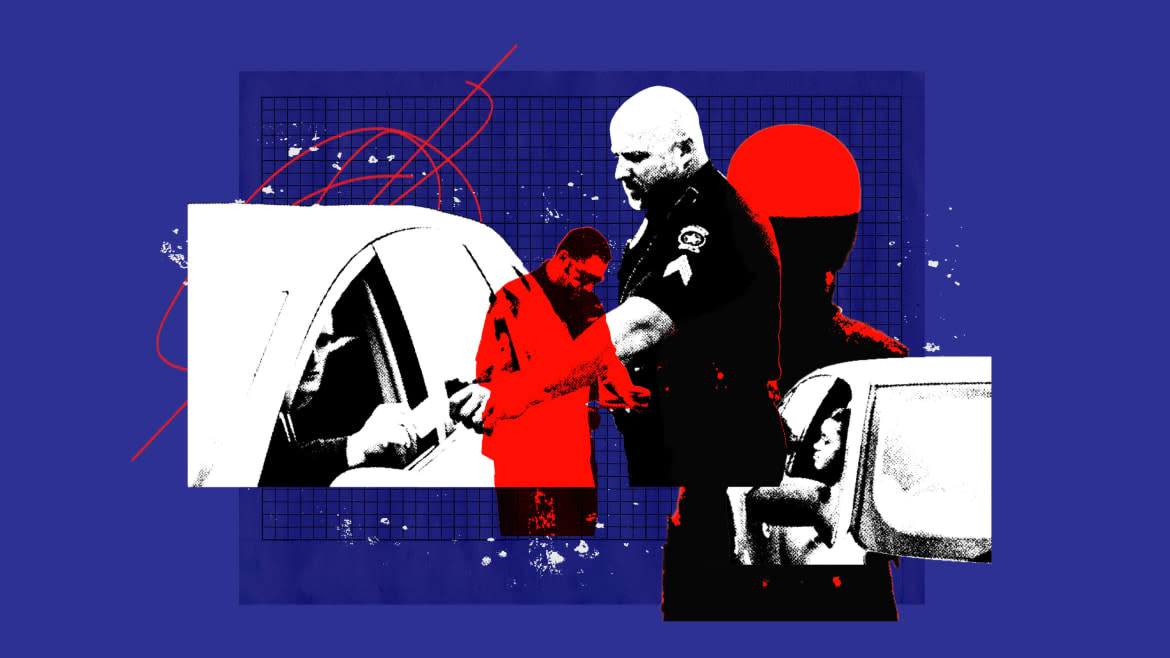Cops Can’t Be Allowed to Just Make Up Reasons for Pulling People Over

Drivers who break traffic laws risk penalties. But innocence did not protect Mario Rosales when a police SUV pulled up behind his Ford Mustang at a red light on June 17, 2022, in Alexandria, Louisiana.
Mario signaled and turned left on green. He did not speed, litter, swerve out of his lane or drive under the influence of drugs or alcohol. He had done nothing illegal.
Neither had his girlfriend, Gracie Lasyone, who was in the passenger seat.
The Mustang was equally clean. It had current tags, working equipment and was not linked to any criminal investigation. The only thing conspicuous about the car was its red color and out-of-state plates, from New Mexico.
Cops Love Immunity—Until They’re the Ones Abused by Police
Officers had no good reason to initiate a traffic stop. Yet they flashed their emergency lights before the Mustang cleared the intersection. Dash-camera and body-camera video shows that Mario pulled over promptly, spoke in a respectful tone and obeyed all police orders. So did Gracie.
Nothing helped. Claiming that Mario had failed to activate his blinker, despite clear video evidence to the contrary, the officers ordered Mario and Gracie out of the car. Then the officers frisked Mario, took his phone, put it in the cab of the police vehicle, forced him to empty his pockets, and grilled him for 20 minutes about his personal life.
They also interrogated Gracie. When she asked—twice—if she could record the encounter on her phone, they refused to allow it. Ultimately, they cited Mario for three alleged infractions that the city eventually dropped.
The entire encounter was bogus, despite police assurances that everything they did was by the book. One officer actually called himself a “constitutionalist,” while violating the Constitution in multiple ways.
Rather than accept the abuse, Mario and Gracie fought back with a civil rights lawsuit. Our public interest law firm, the Institute for Justice, represents them.
The litigation highlights a nationwide problem. Cases in Georgia, Nevada, Oklahoma, Texas, Wyoming, and elsewhere show a similar pattern. Officers use pretexts to conduct traffic stops, then show cavalier disregard for motorists’ constitutional rights.
The Supreme Court Put Politics Above Law and Surrendered Its Legitimacy
Sometimes the goal is fines and fees. Dozens of Louisiana municipalities receive more than half their revenue from citations. One village near Alexandria relies on traffic enforcement for 93 percent of its budget.
Other times the goal is revenue through a process called civil forfeiture, which allows the government to take and keep assets without proving wrongdoing in criminal court. Many law enforcement agencies cash in without arresting or prosecuting anyone. The process works with factory-like efficiency in Detroit.
With Mario and Gracie, the officers seemed to hope the couple were big-time criminals. “There’s more to this than meets the eye,” one officer said. He later expressed disappointment when dispatch informed the officers that Mario and Gracie do not have criminal records.
Regardless of the motive, the practice is the same from coast to coast. Officers don’t wait for legitimate reasons to stop drivers; they stop drivers to find a reason.
The Constitution forbids this mode of policing. The Fourth Amendment requires officers to have reasonable suspicion that motorists did something wrong before detaining them. Officers cannot detain someone to find a crime.
Even if officers have legitimate reasons to make a stop, they cannot unnecessarily prolong the interaction while hunting for additional violations. Yet all too often in Alexandria and elsewhere, officers and their departments escape consequences when they disregard the Constitution.
One reason is simple economics. Holding the government accountable for violating rights is expensive. It does not make financial sense to sue an agency unless its officers inflict serious harm. Yet two problems emerge when casual violations go unpunished.
Here’s Why Legalized Marijuana Won’t End the War on Due Process
First, officers can grow accustomed to ignoring the Constitution. Without fear of reprisal, individual liberties disappear. Second, if rights are enforceable only when the government commits gross violations, then no one is secure from unreasonable searches and seizures—which often start as minor inconveniences.
Mario and Gracie drove away from their police encounter, but others leave in the back of a squad car, ambulance or hearse. No one should have to wait for the worst to happen before insisting on accountability.
If motorists must follow traffic laws, then the police must follow the Constitution.
Marie Miller is an attorney and Daryl James is a writer at the Institute for Justice in Arlington, Va.
Get the Daily Beast's biggest scoops and scandals delivered right to your inbox. Sign up now.
Stay informed and gain unlimited access to the Daily Beast's unmatched reporting. Subscribe now.
